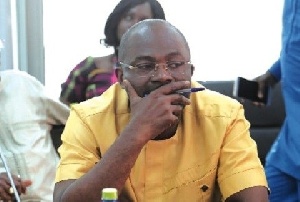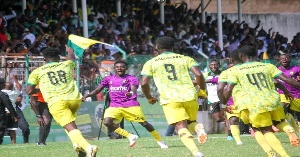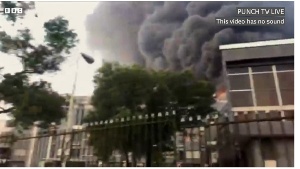- Home - Entertainment
- Lifestyle News
- Year In Review
- Music News
- Entertainers
- Entertainment Archive
- Entertainment Photos
- Jokes
- Entertainment Headlines
- Ameyaw Debrah
- Brown GH
- Celebrities Buzz
- GH Base
- Ghana Celebrities
- Gh Gossip
- GH Page
- GH Splash
- Hot Gossip GH
- YEN
Television of Tuesday, 15 April 2025
Source: www.ghanawebbers.com
Sudan's siege city - BBC smuggles in phones to reveal hunger and fear
"She left no last words. She was dead when carried away," Hafiza says quietly. She describes how her mother was killed in Darfur during Sudan's civil war, which began two years ago.
The 21-year-old recorded her family's struggles after her mother's death. The BBC World Service provided phones to people trapped in el-Fasher, where journalists cannot enter due to constant bombardment.
Hafiza suddenly became responsible for her five-year-old brother and two teenage sisters. Their father had died before the war started, which has caused a humanitarian crisis.
Hafiza helps displaced people in el-Fasher by distributing blankets and food. The army and the paramilitary Rapid Support Forces (RSF) were once allies but fell out over plans for civilian rule.
El-Fasher is the last major city controlled by the military in Darfur. It has been under siege by the RSF for a year. In August 2024, a shell hit the market where her mother sold goods.
"Grief is very difficult; I still can't visit her workplace," Hafiza says in one of her first video messages after receiving her phone. "I spend my time crying alone at home."
Both sides of the conflict have been accused of war crimes, which they deny. The RSF has also denied accusations of genocide against non-Arab groups in other parts of Darfur.
The RSF controls access to el-Fasher and sometimes allows civilians to leave. Hafiza managed to send her siblings to stay with family in a safer area but stayed behind to earn money for them.
In her messages, she shares how she distributes blankets and water to displaced people living in shelters. She also helps at a community kitchen and supports breast cancer awareness groups for some income.
Her nights are spent alone, remembering where her mother and siblings used to sit. "I feel broken," she adds.
Mostafa, 32, filmed as his area came under attack. In almost every video he sent, shelling and gunfire can be heard in the background.
"We endure relentless artillery shelling day and night from the RSF," he says. One day he returned home to find it damaged by shells and looted.
"Everything was turned upside down," he explains, blaming the RSF for looting homes in his neighborhood. While volunteering at a shelter for displaced people, Mostafa hid from intense attacks while filming.
"There is no safe place in el-Fasher," he states. "Even refugee camps are being bombed."
He describes how people drink from contaminated water sources due to a lack of clean water. Both Mostafa and Manahel, 26, volunteered at community kitchens funded by donations from Sudanese living elsewhere.
The UN warns of famine in el-Fasher; it has already occurred at nearby Zamzam camp housing over 500,000 displaced people. Many cannot reach markets or find affordable prices for food.
Manahel helps prepare meals like rice and stew that are often people's only food each day. When fighting began, she had just finished university studying Sharia law.
As fighting reached el-Fasher, Manahel moved with her mother and six siblings further away from danger while their father stayed behind to protect neighbors' belongings—a decision that cost him his life when he was killed by RSF artillery fire in September 2024.
Since the siege began a year ago, nearly 2,000 people have been killed or injured according to UN reports. After sunset, residents rarely leave their homes due to fear; many lack electricity making nights frightening without light sources detectable by drones.
There were times when communication was impossible due to internet outages affecting both Manahel and Hafiza's ability to connect with others outside their city.
They share fears about what might happen if el-Fasher falls into RSF control: "As a girl, I might get raped," Hafiza says.
Their fears stem from events reported in other cities taken by the RSF—most notably el-Geneina—where horrific massacres occurred along ethnic lines.
In 2023 alone between 10,000-15,000 were killed there according to estimates; now over a quarter million residents live as refugees across borders into Chad.
We approached the RSF regarding these accusations but received no response; they previously denied involvement claiming perpetrators wore their clothing.
After months negotiating access with local authorities we visited el-Geneina December 2024 under strict supervision revealing armed patrols controlling streets.
Our minders limited our view showing only what they wanted us see while insisting most residents had returned home despite visible destruction around town.
During interviews locals expressed concerns about rising food prices yet hesitated speaking freely under watchful eyes of our minders who whispered doubts about claims made afterward.
Governor Tijani Karshoum maintained neutrality amid unrest despite previous accusations against him following predecessor’s murder linked directly back towards RSF actions during conflicts occurring since then.
Two weeks later EU imposed sanctions on him citing responsibility related fatal attack on former governor alongside serious human rights abuses committed throughout ongoing violence within region itself.
Mostafa decided it was too dangerous staying behind leaving November alongside both Hafiza & Manahel seeking refuge elsewhere nearby towns instead facing uncertain futures ahead filled anxiety uncertainty surrounding potential returns back home again someday soon amidst escalating tensions remaining prevalent throughout entire country overall situation worsening daily basis overall conditions deteriorating rapidly everywhere else too!










